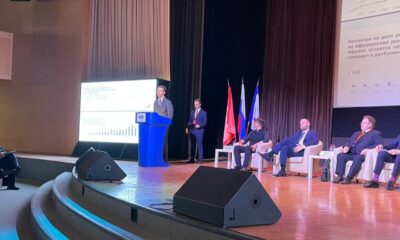National Issues
Arms sale isn’t another name for diplomacy -By Tunji Ajibade

Nigerians would give the United States of America a knock on the head if they had the opportunity. That matter of the refusal to sell arms to Nigeria in order to confront insurgency is the reason. Days back, this writer was watching a programme on TV where the issue was being discussed when a young man nearby angrily said, “Nigeria should just cut off ties with the US.” Then, he had added, “Sir, what do you think?” Well, diplomacy is not so straightforward, had been this writer’s initial response. More explanation was still ongoing when an interviewee on the TV programme informed the anchor that as a retired Nigerian diplomat, he had carefully weighed his responses in the course of the interview, and his opinion had been given with known rules in the business of diplomacy in mind. There are rules to conducting diplomatic relations; so, suggesting severance of diplomatic ties over the issue of arms signposts frustration, and nothing more. This means state officials cannot act like the angry young man suggested. Anyway, the episode had got this writer thinking because earlier on in November, a picture had travelled across the internet. It was that of Russia’s President, Vladimir Putin, receiving the newest US ambassador to his country. Yet, a few days before then, the Russian leader had practically been slapped on the wrist by other Western nations at a gathering of G-20 nations in Australia. And a day after the US ambassador was received in Moscow, the US Vice-President, Joe Biden, went to Kiev from where he threw stones at Russia over its presence in Ukraine. The web in this is worth trailing against the background of the current state of affairs between Nigeria and the US.
Ukraine is thousands of miles away from the US, yet the Americans lead other Western nations to confront Russia over its presence in that country. Why are both sides keen on Ukraine? Why do they bicker but don’t break diplomatic relations? One, after the collapse of the Soviet Union and the US emerged as the world’s sole superpower, it has always been keen to see an independent Ukraine allied to NATO in order to prevent a resurgence of Russia’s power. The interest of the US in Ukraine is also one of the means by which it wants to keep the post-Yalta security order. Post-Yalta arrangement had brought about a bipolar world once led by the US and the defunct USSR. This order had assumed no further annexations of countries in Europe. Under Putin, Russia wants to revive the power and prestige that the USSR lost. It needs nations on its borders to achieve this but left to them none of these nations wants to be in a Russia that seeks to exercise influence on all the former Soviet Republics such as Ukraine. Therefore, Russia’s action at the moment amounts to unilaterally reviewing the post-Yalta security order. The US and its allies hate this. One reason is that Ukraine had surrendered its nuclear arsenal earlier on in exchange for the promise from the US and allies to respect Ukraine’s independence and sovereignty. Although not stated directly, it was assumed also that western countries would defend Ukraine in case of external aggression. Complicating this is the fact that the US is negotiating these same terms with nations that have built nuclear weapons or are close to, in order to have them surrender such in exchange for respecting their borders and helping in case of external invasion. If the US leaves Ukraine to Russia to bully, the implication for negotiations on nuclear containment around the world is obvious.
The complication is more than this and it explains why, though the US and Russia hate each other’s gut at this time, neither side will consider severing diplomatic relations. Instead, they deploy all tools in their diplomatic bag to manage the situation. For instance, several US/NATO allies share borders with Ukraine and Russia and cutting off diplomatic relations with Russia will put such countries at greater risk of Russia trampling on them. Moreover, to maintain its credibility within NATO, the US has to stand firm on Ukraine. As for Russia, it sells gas to the EU countries and it needs the revenue in a situation where its economic base isn’t so wide anymore. Also, its citizens are spread across the same countries. That alone makes even the severance of diplomatic ties a matter of extent, not total, because every country must cater to its citizens no matter what happens in the diplomatic arena. On their part, the Europeans need Russia’s gas, and they need the market that Russia has. These issues make nations involved in the Russia-Ukraine imbroglio tread the way they do: The US and the EU employ incremental sanctions against Russia where such bite the most. Russia catwalks in a way meant not to encourage its antagonists to go too far on the sanction angle, while it continues to juggle the reins to make Ukraine realise Russia won’t ever completely leave it to its own devices for as long as it is within Russia’s sphere of influence. The implication? This matter won’t ever be resolved neatly; it’s geo-politics, and geo-politics is continuous, taking on different shapes at different stages depending on what interests interested powers are pursuing. All the nations involved know this, so cutting diplomatic relations isn’t on the table, managing relations in such a way that each side gets the most out of the situation is what is.
To be noted by Nigerians here is the fact that this matter gets to the point where one side imposes sanctions on the other, yet both treat each other with some level of civility. For diplomacy to work effectively, different mixes may be adopted depending on the situation at hand; even when hostility is fully in town, what is referred to as preventive diplomacy remains relevant for the purpose of ensuring that matters don’t go beyond manageable limits. As scholars will put it, preventive diplomacy is diplomatic action taken to prevent disputes from escalating into conflicts and to limit the spread of conflicts when they occur. While it is conducted in different forms and fora, both public and private, the most common expression of preventive diplomacy is found in the work of diplomatic envoys dispatched to crisis areas to encourage dialogue, compromise and the peaceful resolution of tensions. This is obvious in the US-EU-Russia-Ukraine scenario. Is this in the Nigeria-US case yet? It may be if Nigerian officials and those of the US would sit at a table and examine what the issues are about sale of arms or lack of it. If the latter points out what its grouses are, it may do Nigeria some good to take cognisance of such and take steps to address them rather than engage in wholesale denials that even Nigerians have been programmed to expect.
Aside from this, this writer had once noted on this same page the extent of the relations between Nigeria and the US. It’s wider than the matter of selling and buying of arms. For diplomatic ties are multi-dimensional, too complex to untangle and walk away from without a care. In fact, as Jeffery Hawkins, the Consul-General of the United States of America in Nigeria once put it at the time the debate over the US not buying Nigeria’s crude oil was in vogue, Nigeria-US relationship is “so broad that trade is just one minor element.” Sales of arms constitute just one aspect of this diplomatic contact. In any case, the US pours funds in diverse directions that Nigeria has found useful, including its assistance in the fight against the Ebola Virus Disease the other time. So, if at this time the US chose to look at sales of arms to Nigeria from the prism of values such as democracy, rule of law, and human rights that it promotes (even though the US too isn’t perfect), one would want to submit that the arms brouhaha is just a phase. It shall pass, and diplomacy will continue. In the event, it’s Nigeria that should recalibrate its foreign policy strategy with regard to acquisition of defence hardware, rather than pick on another country that seems to have chosen to relate with Nigeria issue-by-issue, and against the background of some of its patently verifiable national values and foreign policy goals.



















